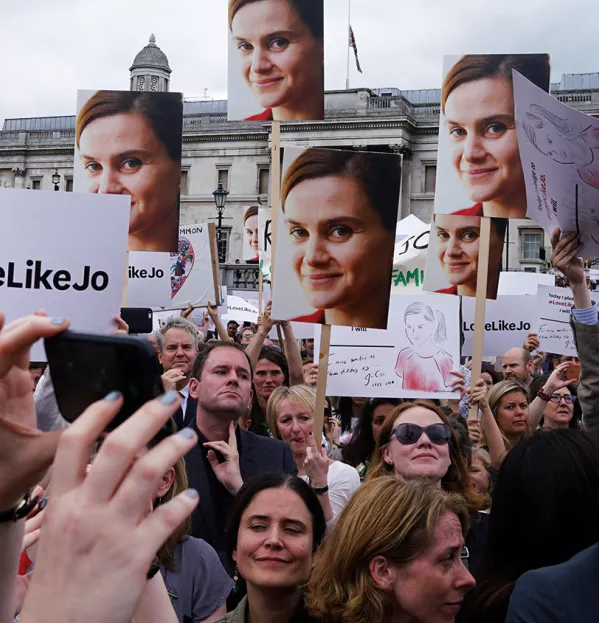‘Be brutally honest with young kids about extremism’

When the MP Jo Cox was shot and stabbed by a far-right extremist, her husband, Brendan, was placed in the unenviable position of having to explain to his young children what had happened.
Then, when a suicide bomber attacked an Ariana Grande concert at Manchester Arena last week, he found himself having to explain all over again to his children - now four and six - how acts of extremism can result in the deaths of innocent people.
“Talking to my own kids about it, I’ve told them what happened, and that people died,” he tells Tes. “But I wanted to couple that with a perspective that they are safe, of reassurance - this hasn’t happened in their lifetime in the UK on this scale. I think that perspective is really important.”
He believes the lessons he has learnt from his own experience of loss are valuable to teachers wanting to discuss the Manchester attack with their pupils. “I think it’s important to be as open and honest as you can be,” he says. “This was actually the advice I was given, in terms of how to talk to the kids about Jo’s murder, which was very much about trying to be as open and as clear and as honest with them about the permanence of it, which is obviously incredibly hard and very brutal and very difficult to do.
“But I think them having a clear picture - even if they start to put more detail on it as they grow up - is really important.”
‘It’s such a tiny minority’
He also insists that teachers - like parents - have a duty to emphasise to children that society is not full of people actively looking to cause harm. “The person who did this is representative of himself and nothing else,” he says. “And so I always think it’s important to bring those things into balance. The number of people - whether they’re like the guy that did this, or the person who killed Jo - it’s such a tiny minority.
“I think the big thing that teachers can do is not to suggest that the individual who did this wasn’t evil, twisted, sick, whatever else. But to identify consistently that this is an individual, who is representative of nobody but themselves.”
Cox met Jo when they were both working for development charity Oxfam. He later went on to advise Gordon Brown on international development during the latter’s period as prime minister. And he and Jo used to discuss strategy during her brief career as MP for the West Yorkshire constituency of Batley and Spen.
Before he spoke to his children about Jo’s death, he took advice from a number of people who had been bereaved themselves, as well as from psychologists and child-bereavement charities.
What he learned - and the message that he would pass on to teachers now - is that one’s instincts are not necessarily to be trusted when it comes to talking to children about death.
For example, he instinctively shied away from taking his children to see Jo’s body. But, following advice, he took them nonetheless, and the experience helped them to grieve.
“Were my instincts right?” he says. “Not on everything, no. I would have spoken to them pretty openly. But I think I probably wouldn’t have been quite as honest and as open as I was. I might have flinched away from being categorical about the permanence of it.”
Demystifying the issues
Teachers, obviously, are in a different position from grieving parents. But Cox says: “I think for teachers some of those principles remain. Progressives and liberals sometimes stop people from having difficult conversations, because they say anybody that has questions about Islam or integration is prejudiced or bigoted.
“And actually it’s really important that there’s a safe place for really open conversations. Because lots of people do have questions about: does it say in the Koran that it’s OK to blow people up? And why is it some people wear the face veil and some people don’t?
“Those are all important questions and, if you feel you can’t ask them, that’s a real problem. I think schools have a really important role to play in demystifying some of those questions and just enabling people to ask open and honest questions - and get open and honest answers to them.”
He believes this is something schools already do very well.
“Jo spent an inordinate amount of time visiting schools in Batley and Spen,” he says. “She loved it. She used to go into every school assembly, and loved talking to them.
“And I was constantly saying” - he pauses and laughs - “‘Why do you spend all your time in schools? It’s a complete waste of bloody time. None of these people can bloody vote.’ And she was, like, ‘I don’t care. Nothing to do with that. I want people in Batley and Spen to know that they can do anything they turn their minds to.’
“She came back enlivened by it - I think by the lack of cynicism the kids had, by the difficult questions she got asked. They were so authentic and often original. I just remember her coming back each time with this real energy and enthusiasm about her.”
You need a Tes subscription to read this article
Subscribe now to read this article and get other subscriber-only content:
- Unlimited access to all Tes magazine content
- Exclusive subscriber-only stories
- Award-winning email newsletters
Already a subscriber? Log in
You need a subscription to read this article
Subscribe now to read this article and get other subscriber-only content, including:
- Unlimited access to all Tes magazine content
- Exclusive subscriber-only stories
- Award-winning email newsletters